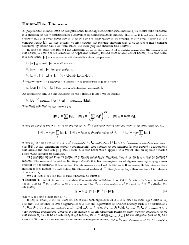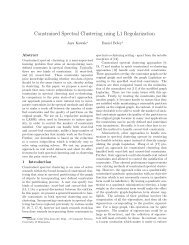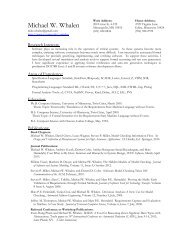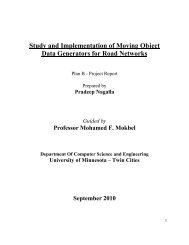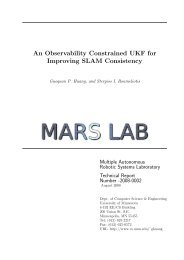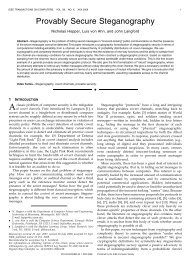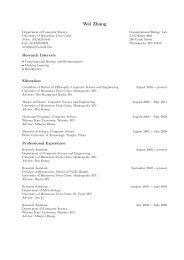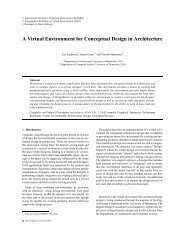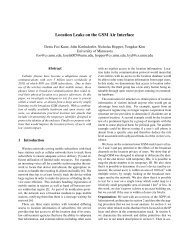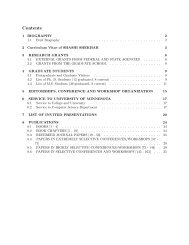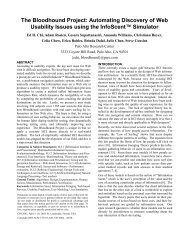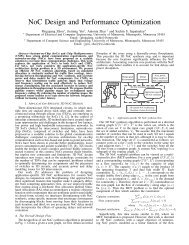- Page 1: Iterative Methods for Sparse Linear
- Page 4 and 5: vi CONTENTS 2.1.2 The Convection Di
- Page 6 and 7: viii CONTENTS 6.11.4 Convergence of
- Page 8 and 9: x CONTENTS 11.5 Matrix-by-Vector Pr
- Page 10 and 11: xii CONTENTS
- Page 12 and 13: xiv PREFACE underlying architecture
- Page 14 and 15: xvi PREFACE The rest could be skipp
- Page 16 and 17: xviii PREFACE
- Page 18 and 19: xx PREFACE Apart from two recent vo
- Page 21 and 22: Chapter 1 BACKGROUND IN LINEAR ALGE
- Page 23 and 24: 1.2. SQUARE MATRICES AND EIGENVALUE
- Page 25 and 26: 1.3. TYPES OF MATRICES 5 • Unitar
- Page 27 and 28: 1.4. VECTOR INNER PRODUCTS AND NORM
- Page 29 and 30: 1.5. MATRIX NORMS 9 (1.8-1.10) and
- Page 31 and 32: 1.7. ORTHOGONAL VECTORS AND SUBSPAC
- Page 33 and 34: 1.7. ORTHOGONAL VECTORS AND SUBSPAC
- Page 35 and 36: 1.8. CANONICAL FORMS OF MATRICES 15
- Page 37 and 38: 1.8. CANONICAL FORMS OF MATRICES 17
- Page 39: 1.8. CANONICAL FORMS OF MATRICES 19
- Page 43 and 44: 1.9. NORMAL AND HERMITIAN MATRICES
- Page 45 and 46: 1.9. NORMAL AND HERMITIAN MATRICES
- Page 47 and 48: 1.10. NONNEGATIVE MATRICES, M-MATRI
- Page 49 and 50: 1.10. NONNEGATIVE MATRICES, M-MATRI
- Page 51 and 52: 1.10. NONNEGATIVE MATRICES, M-MATRI
- Page 53 and 54: 1.11. POSITIVE-DEFINITE MATRICES 33
- Page 55 and 56: 1.12. PROJECTION OPERATORS 35 In ad
- Page 57 and 58: 1.12. PROJECTION OPERATORS 37 In ma
- Page 59 and 60: 1.13. BASIC CONCEPTS IN LINEAR SYST
- Page 61 and 62: 1.13. BASIC CONCEPTS IN LINEAR SYST
- Page 63 and 64: 1.13. BASIC CONCEPTS IN LINEAR SYST
- Page 65 and 66: 1.13. BASIC CONCEPTS IN LINEAR SYST
- Page 67 and 68: Chapter 2 DISCRETIZATION OF PDES Pa
- Page 69 and 70: 2.1. PARTIAL DIFFERENTIAL EQUATIONS
- Page 71 and 72: 2.2. FINITE DIFFERENCE METHODS 51 f
- Page 73 and 74: 2.2. FINITE DIFFERENCE METHODS 53 u
- Page 75 and 76: 2.2. FINITE DIFFERENCE METHODS 55 B
- Page 77 and 78: 2.2. FINITE DIFFERENCE METHODS 57
- Page 79 and 80: 2.2. FINITE DIFFERENCE METHODS 59 i
- Page 81 and 82: 2.2. FINITE DIFFERENCE METHODS 61 T
- Page 83 and 84: 2.3. THE FINITE ELEMENT METHOD 63 o
- Page 85 and 86: 2.3. THE FINITE ELEMENT METHOD 65 F
- Page 87 and 88: 2.3. THE FINITE ELEMENT METHOD 67 i
- Page 89 and 90: 2.4. MESH GENERATION AND REFINEMENT
- Page 91 and 92:
2.5. FINITE VOLUME METHOD 71 3 (a)
- Page 93 and 94:
2.5. FINITE VOLUME METHOD 73 This g
- Page 95 and 96:
Chapter 3 SPARSE MATRICES As descri
- Page 97 and 98:
3.2. GRAPH REPRESENTATIONS 77 Figur
- Page 99 and 100:
3.3. PERMUTATIONS AND REORDERINGS 7
- Page 101 and 102:
3.3. PERMUTATIONS AND REORDERINGS 8
- Page 103 and 104:
3.3. PERMUTATIONS AND REORDERINGS 8
- Page 105 and 106:
3.3. PERMUTATIONS AND REORDERINGS 8
- Page 107 and 108:
3.3. PERMUTATIONS AND REORDERINGS 8
- Page 109 and 110:
3.3. PERMUTATIONS AND REORDERINGS 8
- Page 111 and 112:
3.3. PERMUTATIONS AND REORDERINGS 9
- Page 113 and 114:
3.4. STORAGE SCHEMES 93 containing
- Page 115 and 116:
3.5. BASIC SPARSE MATRIX OPERATIONS
- Page 117 and 118:
3.6. SPARSE DIRECT SOLUTION METHODS
- Page 119 and 120:
3.7. TEST PROBLEMS 99 3 4 1 4 ✻ a
- Page 121 and 122:
3.7. TEST PROBLEMS 101 Figure 3.13:
- Page 123 and 124:
3.7. TEST PROBLEMS 103 P-3.8 Consid
- Page 125 and 126:
Chapter 4 BASIC ITERATIVE METHODS T
- Page 127 and 128:
4.1. JACOBI, GAUSS-SEIDEL, AND SOR
- Page 129 and 130:
4.1. JACOBI, GAUSS-SEIDEL, AND SOR
- Page 131 and 132:
4.1. JACOBI, GAUSS-SEIDEL, AND SOR
- Page 133 and 134:
4.1. JACOBI, GAUSS-SEIDEL, AND SOR
- Page 135 and 136:
4.2. CONVERGENCE 115 4.2.1 General
- Page 137 and 138:
4.2. CONVERGENCE 117 Then, the eige
- Page 139 and 140:
4.2. CONVERGENCE 119 From this and
- Page 141 and 142:
4.2. CONVERGENCE 121 cannot be an i
- Page 143 and 144:
4.2. CONVERGENCE 123 4.2.5 Property
- Page 145 and 146:
4.2. CONVERGENCE 125 Consider now a
- Page 147 and 148:
4.3. ALTERNATING DIRECTION METHODS
- Page 149 and 150:
4.3. ALTERNATING DIRECTION METHODS
- Page 151 and 152:
4.3. ALTERNATING DIRECTION METHODS
- Page 153 and 154:
Chapter 5 PROJECTION METHODS Most o
- Page 155 and 156:
5.1. BASIC DEFINITIONS AND ALGORITH
- Page 157 and 158:
5.2. GENERAL THEORY 137 5.2 General
- Page 159 and 160:
5.2. GENERAL THEORY 139 ✻✯ ❥
- Page 161 and 162:
5.2. GENERAL THEORY 141 Thus, an n-
- Page 163 and 164:
5.3. ONE-DIMENSIONAL PROJECTION PRO
- Page 165 and 166:
5.3. ONE-DIMENSIONAL PROJECTION PRO
- Page 167 and 168:
5.4. ADDITIVE AND MULTIPLICATIVE PR
- Page 169 and 170:
5.4. ADDITIVE AND MULTIPLICATIVE PR
- Page 171 and 172:
5.4. ADDITIVE AND MULTIPLICATIVE PR
- Page 173 and 174:
5.4. ADDITIVE AND MULTIPLICATIVE PR
- Page 175 and 176:
5.4. ADDITIVE AND MULTIPLICATIVE PR
- Page 177 and 178:
Chapter 6 KRYLOV SUBSPACE METHODS P
- Page 179 and 180:
6.2. KRYLOV SUBSPACES 159 Proof. Th
- Page 181 and 182:
6.3. ARNOLDI’S METHOD 161 which s
- Page 183 and 184:
6.3. ARNOLDI’S METHOD 163 from a
- Page 185 and 186:
6.4. ARNOLDI’S METHOD FOR LINEAR
- Page 187 and 188:
6.4. ARNOLDI’S METHOD FOR LINEAR
- Page 189 and 190:
6.4. ARNOLDI’S METHOD FOR LINEAR
- Page 191 and 192:
6.5. GMRES 171 6. Fortunately, an i
- Page 193 and 194:
6.5. GMRES 173 6.5.2 The Householde
- Page 195 and 196:
6.5. GMRES 175 Define the rotation
- Page 197 and 198:
6.5. GMRES 177 3. The residual vect
- Page 199 and 200:
6.5. GMRES 179 6.5.4 Breakdown of G
- Page 201 and 202:
6.5. GMRES 181 note that if ¯ Hm i
- Page 203 and 204:
6.5. GMRES 183 then b − Axm2 = |
- Page 205 and 206:
6.5. GMRES 185 Matrix Iters Kflops
- Page 207 and 208:
6.5. GMRES 187 Proposition 6.12 Ass
- Page 209 and 210:
6.5. GMRES 189 Proof. The following
- Page 211 and 212:
6.5. GMRES 191 In the situation whe
- Page 213 and 214:
6.5. GMRES 193 QMRES/DQGMRES. The k
- Page 215 and 216:
6.6. THE SYMMETRIC LANCZOS ALGORITH
- Page 217 and 218:
6.7. THE CONJUGATE GRADIENT ALGORIT
- Page 219 and 220:
6.7. THE CONJUGATE GRADIENT ALGORIT
- Page 221 and 222:
6.7. THE CONJUGATE GRADIENT ALGORIT
- Page 223 and 224:
6.8. THE CONJUGATE RESIDUAL METHOD
- Page 225 and 226:
6.9. GCR, ORTHOMIN, AND ORTHODIR 20
- Page 227 and 228:
6.10. THE FABER-MANTEUFFEL THEOREM
- Page 229 and 230:
6.11. CONVERGENCE ANALYSIS 209 One
- Page 231 and 232:
6.11. CONVERGENCE ANALYSIS 211 Ther
- Page 233 and 234:
6.11. CONVERGENCE ANALYSIS 213 over
- Page 235 and 236:
6.11. CONVERGENCE ANALYSIS 215 Ther
- Page 237 and 238:
ℑm(z) 6.11. CONVERGENCE ANALYSIS
- Page 239 and 240:
6.12. BLOCK KRYLOV METHODS 219 Kryl
- Page 241 and 242:
6.12. BLOCK KRYLOV METHODS 221 Now
- Page 243 and 244:
6.12. BLOCK KRYLOV METHODS 223 wher
- Page 245 and 246:
6.12. BLOCK KRYLOV METHODS 225 P-6.
- Page 247 and 248:
6.12. BLOCK KRYLOV METHODS 227 is p
- Page 249 and 250:
Chapter 7 KRYLOV SUBSPACE METHODS P
- Page 251 and 252:
7.1. LANCZOS BIORTHOGONALIZATION 23
- Page 253 and 254:
7.1. LANCZOS BIORTHOGONALIZATION 23
- Page 255 and 256:
7.3. THE BCG AND QMR ALGORITHMS 235
- Page 257 and 258:
7.3. THE BCG AND QMR ALGORITHMS 237
- Page 259 and 260:
7.3. THE BCG AND QMR ALGORITHMS 239
- Page 261 and 262:
7.4. TRANSPOSE-FREE VARIANTS 241 AL
- Page 263 and 264:
7.4. TRANSPOSE-FREE VARIANTS 243 th
- Page 265 and 266:
7.4. TRANSPOSE-FREE VARIANTS 245 Ac
- Page 267 and 268:
7.4. TRANSPOSE-FREE VARIANTS 247 4.
- Page 269 and 270:
7.4. TRANSPOSE-FREE VARIANTS 249 Ne
- Page 271 and 272:
7.4. TRANSPOSE-FREE VARIANTS 251 Th
- Page 273 and 274:
7.4. TRANSPOSE-FREE VARIANTS 253 15
- Page 275 and 276:
7.4. TRANSPOSE-FREE VARIANTS 255 P-
- Page 277 and 278:
7.4. TRANSPOSE-FREE VARIANTS 257 A
- Page 279 and 280:
Chapter 8 METHODS RELATED TO THE NO
- Page 281 and 282:
8.2. ROW PROJECTION METHODS 261 the
- Page 283 and 284:
8.2. ROW PROJECTION METHODS 263 ALG
- Page 285 and 286:
8.2. ROW PROJECTION METHODS 265 in
- Page 287 and 288:
8.3. CONJUGATE GRADIENT AND NORMAL
- Page 289 and 290:
8.4. SADDLE-POINT PROBLEMS 269 with
- Page 291 and 292:
8.4. SADDLE-POINT PROBLEMS 271 Apar
- Page 293 and 294:
8.4. SADDLE-POINT PROBLEMS 273 a. S
- Page 295 and 296:
Chapter 9 PRECONDITIONED ITERATIONS
- Page 297 and 298:
9.2. PRECONDITIONED CONJUGATE GRADI
- Page 299 and 300:
9.2. PRECONDITIONED CONJUGATE GRADI
- Page 301 and 302:
9.2. PRECONDITIONED CONJUGATE GRADI
- Page 303 and 304:
9.3. PRECONDITIONED GMRES 283 Somet
- Page 305 and 306:
9.3. PRECONDITIONED GMRES 285 9.3.3
- Page 307 and 308:
9.4. FLEXIBLE VARIANTS 287 In most
- Page 309 and 310:
9.4. FLEXIBLE VARIANTS 289 Proposit
- Page 311 and 312:
9.5. PRECONDITIONED CG FOR THE NORM
- Page 313 and 314:
9.6. THE CONCUS, GOLUB, AND WIDLUND
- Page 315 and 316:
9.6. THE CONCUS, GOLUB, AND WIDLUND
- Page 317 and 318:
Chapter 10 PRECONDITIONING TECHNIQU
- Page 319 and 320:
10.2. JACOBI, SOR, AND SSOR PRECOND
- Page 321 and 322:
10.3. ILU FACTORIZATION PRECONDITIO
- Page 323 and 324:
10.3. ILU FACTORIZATION PRECONDITIO
- Page 325 and 326:
10.3. ILU FACTORIZATION PRECONDITIO
- Page 327 and 328:
10.3. ILU FACTORIZATION PRECONDITIO
- Page 329 and 330:
10.3. ILU FACTORIZATION PRECONDITIO
- Page 331 and 332:
10.3. ILU FACTORIZATION PRECONDITIO
- Page 333 and 334:
10.3. ILU FACTORIZATION PRECONDITIO
- Page 335 and 336:
10.3. ILU FACTORIZATION PRECONDITIO
- Page 337 and 338:
10.3. ILU FACTORIZATION PRECONDITIO
- Page 339 and 340:
10.3. ILU FACTORIZATION PRECONDITIO
- Page 341 and 342:
10.4. THRESHOLD STRATEGIES AND ILUT
- Page 343 and 344:
10.4. THRESHOLD STRATEGIES AND ILUT
- Page 345 and 346:
10.4. THRESHOLD STRATEGIES AND ILUT
- Page 347 and 348:
10.4. THRESHOLD STRATEGIES AND ILUT
- Page 349 and 350:
10.4. THRESHOLD STRATEGIES AND ILUT
- Page 351 and 352:
10.4. THRESHOLD STRATEGIES AND ILUT
- Page 353 and 354:
10.4. THRESHOLD STRATEGIES AND ILUT
- Page 355 and 356:
10.4. THRESHOLD STRATEGIES AND ILUT
- Page 357 and 358:
10.5. APPROXIMATE INVERSE PRECONDIT
- Page 359 and 360:
10.5. APPROXIMATE INVERSE PRECONDIT
- Page 361 and 362:
10.5. APPROXIMATE INVERSE PRECONDIT
- Page 363 and 364:
10.5. APPROXIMATE INVERSE PRECONDIT
- Page 365 and 366:
10.5. APPROXIMATE INVERSE PRECONDIT
- Page 367 and 368:
10.5. APPROXIMATE INVERSE PRECONDIT
- Page 369 and 370:
10.5. APPROXIMATE INVERSE PRECONDIT
- Page 371 and 372:
10.6. REORDERING FOR ILU 351 become
- Page 373 and 374:
10.6. REORDERING FOR ILU 353 Rows 1
- Page 375 and 376:
10.7. BLOCK PRECONDITIONERS 355 A b
- Page 377 and 378:
10.8. PRECONDITIONERS FOR THE NORMA
- Page 379 and 380:
10.8. PRECONDITIONERS FOR THE NORMA
- Page 381 and 382:
10.8. PRECONDITIONERS FOR THE NORMA
- Page 383 and 384:
10.8. PRECONDITIONERS FOR THE NORMA
- Page 385 and 386:
10.8. PRECONDITIONERS FOR THE NORMA
- Page 387 and 388:
10.8. PRECONDITIONERS FOR THE NORMA
- Page 389 and 390:
Chapter 11 PARALLEL IMPLEMENTATIONS
- Page 391 and 392:
11.3. TYPES OF PARALLEL ARCHITECTUR
- Page 393 and 394:
11.3. TYPES OF PARALLEL ARCHITECTUR
- Page 395 and 396:
11.3. TYPES OF PARALLEL ARCHITECTUR
- Page 397 and 398:
11.4. TYPES OF OPERATIONS 377 among
- Page 399 and 400:
11.5. MATRIX-BY-VECTOR PRODUCTS 379
- Page 401 and 402:
11.5. MATRIX-BY-VECTOR PRODUCTS 381
- Page 403 and 404:
11.5. MATRIX-BY-VECTOR PRODUCTS 383
- Page 405 and 406:
11.5. MATRIX-BY-VECTOR PRODUCTS 385
- Page 407 and 408:
11.6. STANDARD PRECONDITIONING OPER
- Page 409 and 410:
11.6. STANDARD PRECONDITIONING OPER
- Page 411 and 412:
11.6. STANDARD PRECONDITIONING OPER
- Page 413 and 414:
Chapter 12 PARALLEL PRECONDITIONERS
- Page 415 and 416:
12.3. POLYNOMIAL PRECONDITIONERS 39
- Page 417 and 418:
12.3. POLYNOMIAL PRECONDITIONERS 39
- Page 419 and 420:
12.3. POLYNOMIAL PRECONDITIONERS 39
- Page 421 and 422:
12.3. POLYNOMIAL PRECONDITIONERS 40
- Page 423 and 424:
12.3. POLYNOMIAL PRECONDITIONERS 40
- Page 425 and 426:
12.3. POLYNOMIAL PRECONDITIONERS 40
- Page 427 and 428:
12.4. MULTICOLORING 407 22 10 23 11
- Page 429 and 430:
12.5. MULTI-ELIMINATION ILU 409 D1
- Page 431 and 432:
12.5. MULTI-ELIMINATION ILU 411 as
- Page 433 and 434:
12.5. MULTI-ELIMINATION ILU 413 1.
- Page 435 and 436:
12.6. DISTRIBUTED ILU AND SSOR 415
- Page 437 and 438:
12.7. OTHER TECHNIQUES 417 As in th
- Page 439 and 440:
12.7. OTHER TECHNIQUES 419 The prec
- Page 441 and 442:
12.7. OTHER TECHNIQUES 421 P-12.3 S
- Page 443 and 444:
Chapter 13 MULTIGRID METHODS The co
- Page 445 and 446:
13.2. MATRICES AND SPECTRA OF MODEL
- Page 447 and 448:
13.2. MATRICES AND SPECTRA OF MODEL
- Page 449 and 450:
13.2. MATRICES AND SPECTRA OF MODEL
- Page 451 and 452:
13.2. MATRICES AND SPECTRA OF MODEL
- Page 453 and 454:
13.2. MATRICES AND SPECTRA OF MODEL
- Page 455 and 456:
13.2. MATRICES AND SPECTRA OF MODEL
- Page 457 and 458:
13.3. INTER-GRID OPERATIONS 437 and
- Page 459 and 460:
13.4. STANDARD MULTIGRID TECHNIQUES
- Page 461 and 462:
13.4. STANDARD MULTIGRID TECHNIQUES
- Page 463 and 464:
13.4. STANDARD MULTIGRID TECHNIQUES
- Page 465 and 466:
13.4. STANDARD MULTIGRID TECHNIQUES
- Page 467 and 468:
13.4. STANDARD MULTIGRID TECHNIQUES
- Page 469 and 470:
13.4. STANDARD MULTIGRID TECHNIQUES
- Page 471 and 472:
13.5. ANALYSIS FOR THE TWO-GRID CYC
- Page 473 and 474:
13.5. ANALYSIS FOR THE TWO-GRID CYC
- Page 475 and 476:
13.6. ALGEBRAIC MULTIGRID 455 to sa
- Page 477 and 478:
13.6. ALGEBRAIC MULTIGRID 457 It is
- Page 479 and 480:
13.6. ALGEBRAIC MULTIGRID 459 all k
- Page 481 and 482:
13.6. ALGEBRAIC MULTIGRID 461 • T
- Page 483 and 484:
13.6. ALGEBRAIC MULTIGRID 463 1. f
- Page 485 and 486:
13.7. MULTIGRID VS KRYLOV METHODS 4
- Page 487 and 488:
13.7. MULTIGRID VS KRYLOV METHODS 4
- Page 489 and 490:
Chapter 14 DOMAIN DECOMPOSITION MET
- Page 491 and 492:
14.1. INTRODUCTION 471 in Figure 14
- Page 493 and 494:
14.1. INTRODUCTION 473 4. Subdomain
- Page 495 and 496:
14.2. DIRECT SOLUTION AND THE SCHUR
- Page 497 and 498:
14.2. DIRECT SOLUTION AND THE SCHUR
- Page 499 and 500:
14.2. DIRECT SOLUTION AND THE SCHUR
- Page 501 and 502:
14.2. DIRECT SOLUTION AND THE SCHUR
- Page 503 and 504:
14.2. DIRECT SOLUTION AND THE SCHUR
- Page 505 and 506:
14.3. SCHWARZ ALTERNATING PROCEDURE
- Page 507 and 508:
14.3. SCHWARZ ALTERNATING PROCEDURE
- Page 509 and 510:
14.3. SCHWARZ ALTERNATING PROCEDURE
- Page 511 and 512:
14.3. SCHWARZ ALTERNATING PROCEDURE
- Page 513 and 514:
14.3. SCHWARZ ALTERNATING PROCEDURE
- Page 515 and 516:
14.3. SCHWARZ ALTERNATING PROCEDURE
- Page 517 and 518:
14.4. SCHUR COMPLEMENT APPROACHES 4
- Page 519 and 520:
14.4. SCHUR COMPLEMENT APPROACHES 4
- Page 521 and 522:
14.5. FULL MATRIX METHODS 501 inter
- Page 523 and 524:
14.5. FULL MATRIX METHODS 503 Assum
- Page 525 and 526:
14.6. GRAPH PARTITIONING 505 14.6.2
- Page 527 and 528:
14.6. GRAPH PARTITIONING 507 The ma
- Page 529 and 530:
14.6. GRAPH PARTITIONING 509 ALGORI
- Page 531 and 532:
14.6. GRAPH PARTITIONING 511 Figure
- Page 533:
14.6. GRAPH PARTITIONING 513 foo wi
- Page 536 and 537:
516 BIBLIOGRAPHY [16] O. AXELSSON,
- Page 538 and 539:
518 BIBLIOGRAPHY [48] , An iterativ
- Page 540 and 541:
520 BIBLIOGRAPHY [83] N. CHRISOCHOI
- Page 542 and 543:
522 BIBLIOGRAPHY [117] H. C. ELMAN
- Page 544 and 545:
524 BIBLIOGRAPHY [153] G. H. GOLUB
- Page 546 and 547:
526 BIBLIOGRAPHY [188] R. KETTLER,
- Page 548 and 549:
528 BIBLIOGRAPHY [222] C. C. PAIGE,
- Page 550 and 551:
530 BIBLIOGRAPHY [255] Y. SAAD AND
- Page 552 and 553:
532 BIBLIOGRAPHY [289] H. A. VAN DE
- Page 554 and 555:
534 BIBLIOGRAPHY [324] L. ZHOU AND
- Page 556 and 557:
536 INDEX block GMRES, 222-223 mult
- Page 558 and 559:
538 INDEX Element-By-Element precon
- Page 560 and 561:
540 INDEX ILU, 301-332 Crout varian
- Page 562 and 563:
542 INDEX normal, 4, 21 orthogonal,
- Page 564 and 565:
544 INDEX by ILQ, 359 EBE, 417 inco
- Page 566 and 567:
546 INDEX permutation and reorderin



